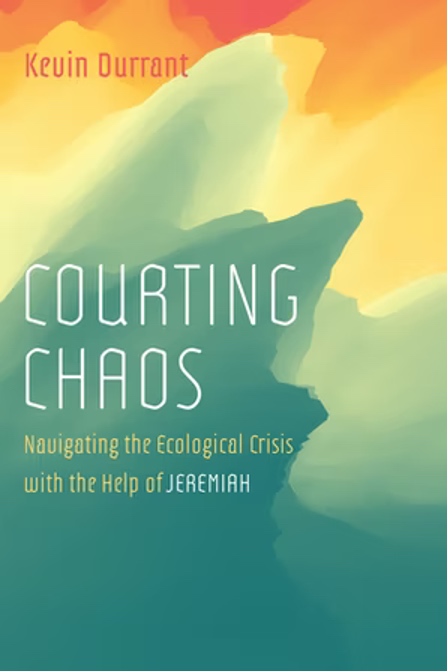Navigating the ecological crisis with the help of Jeremiah
Baptist minister Kevin Durrant introduces his new book Courting Chaos, in which he searches for understanding and hope within the worsening climate crisis, using scripture, art, poetry and environmental activism
 Having taken part in the ecumenical Pilgrimage to Paris in November 2015 to pray for and lobby the delegates at the Paris Climate Conference, I shared the exhilaration felt by many when that conference concluded with an historic agreement. However, just four days after it was signed, the UK parliament voted to allow companies to frack shale gas from under our national parks. The sight of our government so quickly reverting to “business as usual” was very disillusioning, and this hasn’t been helped by seeing the ecological situation worsen ever since.
Having taken part in the ecumenical Pilgrimage to Paris in November 2015 to pray for and lobby the delegates at the Paris Climate Conference, I shared the exhilaration felt by many when that conference concluded with an historic agreement. However, just four days after it was signed, the UK parliament voted to allow companies to frack shale gas from under our national parks. The sight of our government so quickly reverting to “business as usual” was very disillusioning, and this hasn’t been helped by seeing the ecological situation worsen ever since.
I realised that the prophet Jeremiah must have felt a similar disillusionment when his warnings to the leaders and people of Judah about an imminent Babylonian invasion fell on deaf ears. I saw parallels between the chaos brought about by that invasion and the growing climate instability we face today. Both crises seem to suggest a reversion to the chaos that existed before the earth’s creation.
Courting Chaos therefore begins with an exploration of how, in Genesis 1 (and according to the ancient view of the universe) the waters of chaos were not completely destroyed but rather restrained behind the barriers of sky and beach. From the story of Noah’s Flood, it is clear that these barriers can be weakened by human sin and violence, and that obedience to the Law of Moses would later become the prime means of holding back the chaotic waters, whether expressed as political instability or foreign invasion. This explains why Jeremiah, in a sobering passage, describes the destruction to be inflicted by the Babylonians as a reversal of creation (4:23-28).
Subsequent chapters of my book draw out the parallels between Jeremiah’s experiences and our own, and the challenging questions these parallels raise. For example:
-
There was a tipping point when the Babylonian invasion became inevitable; have we reached a similar tipping point in our current ecological crisis, and how do we reconcile this with God’s love and sovereignty?
-
Should Christians work towards the collapse of an environmentally damaging economic system when such a collapse might cause even greater suffering, especially to the poor?
-
What does it mean for us to fulfil the prophetic role of “standing in the breach”?
-
Can we learn from Jeremiah’s practice of lament?
-
Are there ways in which we richer nations resemble the basket of bad figs described in Jeremiah 24?
-
How might Jeremiah’s seemingly crazy act of buying a field in the middle of a siege inspire our own ecologically prophetic actions, however small they may appear?
-
What role can animals and birds play in guiding our response to the climate crisis?
The book concludes by widening the biblical focus to include the mission and experiences of Jonah and Jesus. Both were overwhelmed by the waters of chaos – Jonah within the belly of a fish because of his own behaviour, and Jesus within the darkness of a tomb because of the behaviour of others. Finding Jesus within the storm was crucial for his followers – whether they were battered by literal waves on Lake Galilee, or by waves of grief in the garden tomb.
Here, as in the rest of the book, works of art are used to enable a deeper understanding. One of these is the stunning east window in the church of St Martin in the Fields, Trafalgar Square, the starting point for the 2015 Pilgrimage to Paris. It shows a crucified figure emerging from what look like ripples, as if Christ is overcoming the waters of chaos.
The final image used in the book is of a woodcut of the two disciples on the road to Emmaus (transposed to a shell-blasted First World War landscape). It spoke to me about the disillusion I felt returning from Paris in 2015: “but we had hoped that [the Paris Conference] was the one [which] was going to redeem [the earth]” (Lk 24:21).
But it also reminded me that Christ has still been with me, revealing himself through the wisdom and hospitality I have received from fellow activists over the last six years. The book, therefore, finishes with my wife and I getting ready, like those two disciples, to return to the city – in our case, Glasgow. There at COP26 and over the coming months, our desire is to continue the witness of Jeremiah; namely, to highlight the seriousness of the crisis we face and to call people to work for a future in which “houses, fields and vineyards will again be bought in this land” (32:15).
Courting Chaos - Navigating the Ecological Crisis with the Help of Jeremiah by Kevin Durrant is published by Wipf and Stock.
Kevin is the minister of Keynsham Baptist Church, Bristol. He is also the author of The Earth Will Teach You (Wide Margin 2014)
Do you have a view? Share your thoughts via our letters' page.
Baptist Times, 14/01/2022